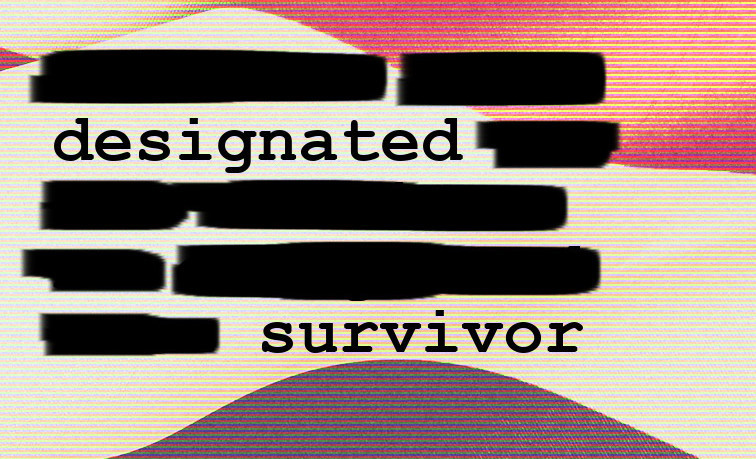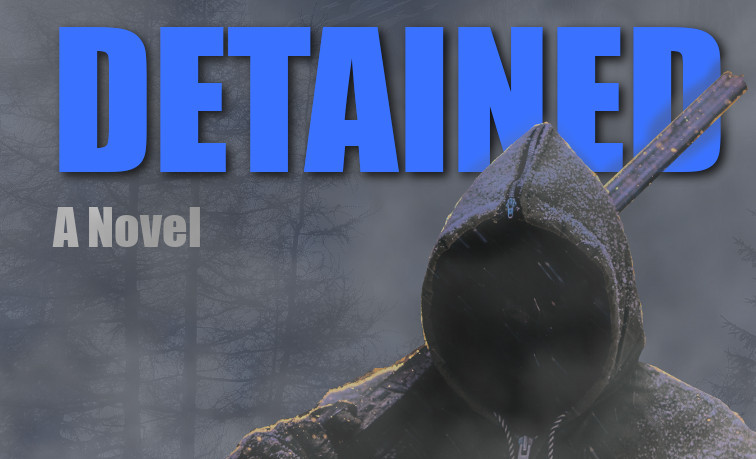Designated Survivor Chapter 1

I’ll be posting one chapter of my novel Designated Survivor every week throughout 2022. Download links below.
1.
Thirty seconds before they came for him, John Renicks, Ph.D. was sitting on his front porch wondering if it was too early to start drinking. As he watched the trio of black cars barreling down the road towards him, he decided it probably was. But only just.
The cars were equipped with built-in flashers and cherry lights; all of them firing. He thought of his phones, all three of which had been ringing every few minutes for the last hour. He’d decided to let them ring, because he wanted some peace and quiet before The Speech. Watching the cars, he thought perhaps that had been a poor decision.
He’d assumed it was his staff calling with some crisis. Or perhaps the White House, with a minor edit to the fifty-three words — a better term, or some statistic that needed confirmation. In an hour, he knew, he would be back on his best behavior. In an hour he would be alert and well-groomed and responsive, tapping away at his phone and putting out all the little fires. In a little more than an hour he would be pinned into his most sober-looking suit, the one reserved for funerals and press conferences, and applauding on cue like a good cabinet member. In an hour. For the moment, for the next few moments, he was engaging in a small protest at the yawning chasm of futility he felt his job was becoming.
His eyes went to the trio of cars. He thought of Uncle Richie. Richie stubbing out an unfiltered cigarette, immediately lighting a new one. He’d said, never worry about cops out front of your house with their lights on, shotguns in their hands. If cop cars are swarming up to your house, relax, they’re serving a warrant. If they’re coming to arrest you, they don’t bulldog in with a lot of noise, they sneak in the back with Kevlar and hand signals.
The lead SUV turned smoothly and jerked to a stop in his driveway. The second SUV stopped in the street. The sedan was coming too fast behind it and turned suddenly, bumping up onto his lawn. All three vehicles idled. No one killed the engines.
These weren’t cops. The cars were brand new domestic models with Federal plates. Three doors opened simultaneously; the passenger-side doors on the SUVs, the driver’s door on the sedan. Three men in dark suits climbed out. The one in the driveway was a thin man. Younger than him. Renicks thought his suit was decent but not showy, and while it fit well it had not been tailored; it was off the rack. His haircut was the buzz favored by ex-military, and his sunglasses were the mirrored aviator style apparently handed out at police academy graduations around the world. A tiny, flesh-colored earbud in one ear. His shoes were modest square-toed dress shoes, not new, that had been recently shined to an unnatural sheen.
The thin, younger man stood for a moment scanning his surroundings in silence. Renicks looked at the other two.
The one by the other SUV was a little older and had a belly that was ruining the line of his jacket. He was the funhouse mirror image of the first guy. He spun slowly, scanning the neighborhood. It was easier to tell that he had a gun holster jammed under his shoulder, because the jacket bunched up a little.
The one by the sedan was a little different: Longer hair, a more relaxed, casual posture. He wasn’t scanning the neighborhood. He was scanning Renicks; eyes locked on him. He didn’t look away when Renicks noticed him, either. Just stood there by the car, studying him. His thin black tie was slightly askew, the knot hastily done and off-kilter.
“Secretary Renicks?” the man in the driveway shouted, walking around the front of the SUV and approaching the porch.
Renicks nodded. “I pay a kid named Jimmy fifteen dollars a week to keep my lawn the award-winning shape it’s in,” he said. “Your driver there owes me fifteen bucks.”
The younger man glanced at the sedan for a moment just slightly longer than casual or polite interest would allow. Like he was staring the driver down. For his part the sedan’s driver shifted his weight and frowned.
Then the first man turned back to Renicks and started up the stairs. “You will have to file a claim with our office. The paperwork is kind of extensive. You are John No Middle Name Renicks, Secretary of Education?” he said, extracting a device with a screen on it and holding it up between them. Comparing him to a photo, Renicks thought.
He nodded, picking up his coffee again. “Call me Jack.”
“Secretary Renicks, I am Special Agent Gorshin of the United States Secret Service.” He pushed the device back into his pocket as he gained the main level of the porch. “Under the specifications of the revised National Security and Homeland Security Presidential Directive, you have been selected as the Designated Survivor for a period lasting the next eight hours.” He nodded. “Please take five minutes to pack essentials and report to Agent Darmity for transport to the Secure Facility.”
Renicks blinked. The kid was used to being obeyed, he thought; he’d already moved on to the next thing on his to-do list, and he’d issued his orders in the maddeningly polite manner of someone secure in his own authority.
He shook his head and sipped some coffee. “You’re mistaken, son,” he said, liking the way the word son got a twitch of the shoulder from Gorshin. The dim side of being a hotshot was being treated like an asshole by everyone who had a decade on you. Renicks looked past him at Darmity, still glowering by the car. Like him, he decided, pissed off to have someone five years younger bossing him around. He looked back at Gorshin. “I’m not holding the bag on this. It’s Flanagan. The Attorney General’s spending the night in the mountain.”
Gorshin made a show of checking his watch, an immense stainless steel thing strapped to his wrist. He had the physicality of someone in excellent shape; efficient movements that bunched his suit in a burly way. Renicks decided he wouldn’t be challenging Special Agent Gorshin to any wrestling matches. “Negative, Mr. Secretary. Attorney General Flanagan suffered a heart attack this afternoon.” He paused for a moment, and when he continued his voice had softened slightly. “I am very sorry to report he’s passed away. Per circulating memorandum, you are next on the list. Please pack your essentials, sir. We must be on the road in four minutes to rendezvous with local PD for highway escort.”
Renicks looked down at his coffee, picturing Gerry. Fat old Gerry with the jowls that seemed to jiggle every time he moved and the sharp legal mind that snagged on every jagged point in an argument. Gerry, who was exhausting to debate, untiring in his ability to find new tactics when trying to win a point. He’d had plenty of debates with Gerry, who thought his politics naïve and soft. Dangerous, even. Renicks had liked Gerry without having any affection for the man. And Gerry had been Grant’s attack dog these past two years, carrying the President’s water without complaint — with, Renicks thought, an enthusiasm that had been remarkable. But then all the men and women closest to Grant, his inner circle, were like that. To them, Grant was never wrong, and whatever directive he issued they pursued doggedly, without question. Renicks reflected that he’d never felt that kind of bond with Grant. Had always felt a disconnect with the man.
“Jesus,” he said. “Gerry Flanagan.”
“Yes, sir,” Gorshin said crisply.
“Did he have any family?”
Gorshin appeared to be maintaining his composure with some effort. Renicks thought it was almost comical, if the man wasn’t someone he suspected to be a trained killer formerly of some elite military unit. “No, sir, we haven’t been able to locate next of kin. Mr. Flanagan was a widower, with no children.” He waited the barest of beats. “I am sorry, sir, but we have to move in — ” he glanced at his big watch “ — two minutes forty five.” He paused, and then offered Renicks a little shrug. “We have been trying to contact you for the past forty-five minutes, Mr. Secretary.”
Renicks didn’t move. He’d known since accepting the post of Secretary of Education eight months before that this might happen. After sitting through a hurried confirmation hearing in front of the HELP committee there had been an orientation, just as perfunctory, and this had been part of it. At the time he’d thought the orientation all wrong; instead of impressing on him his essential role in the Continuity of Government program, they should have advised him of the frustration level of being in the cabinet of a President enjoying an approval rating of thirty-seven and dropping. The orientation should have prepared him for the fact that after working for months on proposals and recommendations for the President’s final year in office, turning in a book-length report complete with interactive Power Point presentations, videos, and endless documentations, he would see all that work boiled down to fifty-three words in the State of the Union Address.
Fifty-three words. President Grant hadn’t even told him personally.
Renicks sipped his coffee and remembered the President — whom he sometimes, when the moment was right, called “Chuck” — telling him not to worry about being divorced. Because no one knew who the Secretary of Education was anyway. At the time that had sounded friendly and charmingly blunt. For a moment he’d felt like he and President Grant might be friends. Then he’d wondered if that wasn’t just Grant’s crazy charm, which felt like a physical thing when you he spoke to you. Compelling you to like him, to trust him.
President Grant’s assessment now comforted him. Anonymity would be to his benefit when Grant lost his bid for re-election later in the year. His traditional resignation would be accepted by an incoming administration, and no one would ever remember he’d been Secretary of Education.
Agent Gorshin was still absorbed, tapping out a message on his phone, his face a ruddy mask of concentration. Renicks did not like being rushed, under any circumstances, and purposefully glanced at Gorshin’s wrist without making any effort to stand. Gorshin’s watch was huge, shiny, and looked like it had a million little features. Endorsed, he guessed, by Navy Seals and Special Ops types. Renicks decided Gorshin wanted people to know he was ex-military.
He finally stood up, but couldn’t resist tweaking Gorshin one last time with what he assumed was unaccustomed insubordination from a civilian. “Do you or your team want some coffee?”
Gorshin blinked. Renicks categorized his expression as amazed and enjoyed it immensely. Then Gorshin shook his head, all business. “No, sir. Do you need assistance packing?”
Renicks shook his head. “I’ve got a bag.” In his orientation he’d been handed a thick manual of emergency procedures and other Federal arcana, and he’d read it in one evening with a bottle of Glenmorangie 10-year for company.
The manual stipulated everyone in the Presidential Line of Succession were required to have a travel bag ready at all times; in the event of dire emergency the entire government might be evacuated to a secure facility — there were several around the country. So, he’d packed one. He called it his End of the World Bag. A backup laptop, a change of clothes, a pocket bottle of Scotch, his eBook reader stocked with every book he’d ever read, a shaving and toiletry kit, the old chrome Zippo his Uncle Richie had given him when he’d graduated college, a minimal survival kit including matches, fishing line, a small-game snare, water purification tabs, a few other things he wasn’t certain of, and a Kimber stainless 1911 pistol with spare magazine. He felt a little silly about the Boy Scout Survival Kit, as he thought of it.
He felt sillier about the Kimber, sometimes.
He would rendezvous with his office desk and take a USB drive that contained backups of his office and home computer hard drives that were only a few hours out of date.
As he walked into the house he wondered if the Secret Service agents would search his bag for any reason. If the gun would be an issue. He had a permit for it in New Jersey, but he’d never thought to update anything about it when he’d moved to Virginia, and he knew Jersey and Virginia were not reciprocal on concealed weapons permits.
He decided to take the chance. It was an End of the World Bag, after all. If he had to use it, the world had ended, and if the world had ended, he suspected he might need a gun.
Three minutes later, he stepped back on the porch with his bag slung over his shoulder, his business cell phone in one hand and a large travel cup of coffee in the other. He nodded at Gorshin, suddenly eager to get away.
“Let’s go.”


